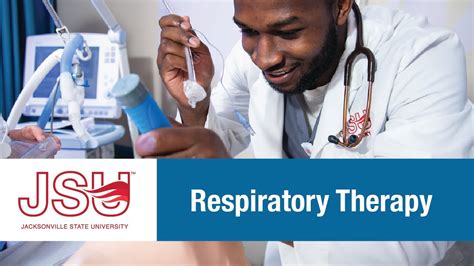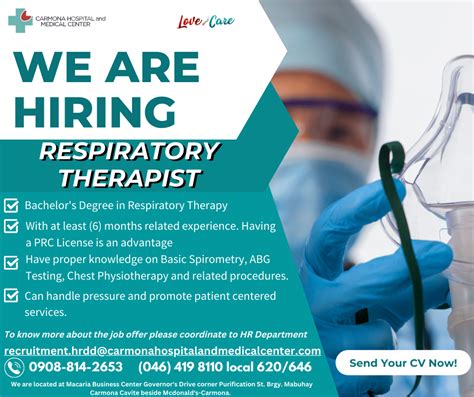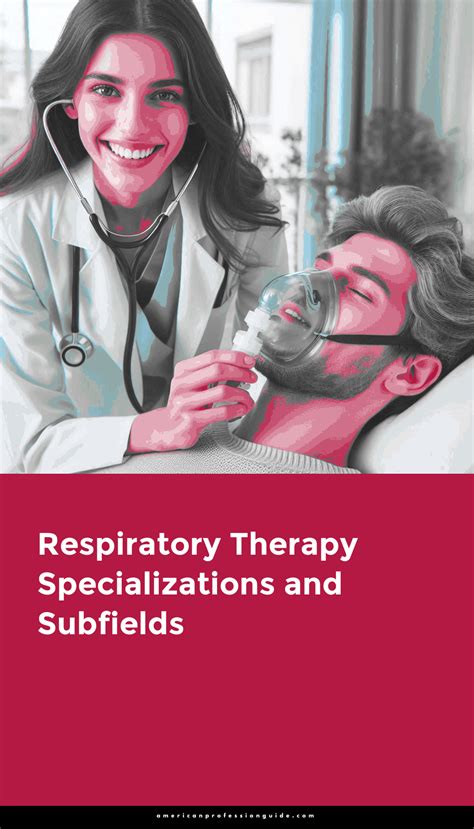Intro
Explore the world of respiratory care therapist jobs and career opportunities. Learn about the roles, responsibilities, and requirements of respiratory therapists, as well as the various settings they work in, from hospitals to home care. Discover the benefits, salary ranges, and growth prospects of this rewarding healthcare profession.
As the world grapples with an increasing number of respiratory-related illnesses, the demand for skilled respiratory care therapists has never been more pressing. Respiratory care therapists, also known as respiratory therapists, play a vital role in helping patients breathe easily and managing respiratory conditions. If you're considering a career in this field, you're in luck! We'll delve into the world of respiratory care therapist jobs and career opportunities, exploring the responsibilities, requirements, and growth prospects.
The Importance of Respiratory Care Therapists
Respiratory care therapists are essential members of the healthcare team, working closely with doctors, nurses, and other medical professionals to provide top-notch patient care. Their primary responsibility is to assess, diagnose, and treat patients with respiratory disorders, such as asthma, chronic obstructive pulmonary disease (COPD), and pneumonia. By administering various treatments, including oxygen therapy, inhalation therapy, and mechanical ventilation, respiratory care therapists help patients breathe more easily and manage their symptoms effectively.

Key Responsibilities of Respiratory Care Therapists
As a respiratory care therapist, your primary responsibilities will include:
- Conducting patient assessments to identify respiratory problems and develop treatment plans
- Administering oxygen therapy, inhalation therapy, and mechanical ventilation
- Monitoring patients' progress and adjusting treatment plans as needed
- Collaborating with healthcare teams to develop and implement patient care plans
- Educating patients and their families on respiratory care and management techniques
Education and Training Requirements
To become a respiratory care therapist, you'll need to complete a minimum of an associate's degree in respiratory therapy from an accredited program. These programs typically take two years to complete and include coursework in subjects like anatomy, physiology, and pharmacology. Many respiratory care therapists also choose to pursue a bachelor's degree, which can take four years to complete.
In addition to formal education, respiratory care therapists must also obtain certification from the National Board for Respiratory Care (NBRC). The NBRC offers two certification levels: Certified Respiratory Therapist (CRT) and Registered Respiratory Therapist (RRT). To become certified, you'll need to pass a written exam and demonstrate your skills and knowledge in areas like patient assessment, treatment planning, and equipment operation.
Job Outlook and Career Opportunities
The job outlook for respiratory care therapists is extremely positive, with the Bureau of Labor Statistics (BLS) predicting a 21% growth in employment opportunities through 2028. This growth is driven by an aging population, an increase in respiratory-related illnesses, and advances in medical technology.
Respiratory care therapists can work in a variety of settings, including:
- Hospitals and healthcare systems
- Clinics and physician offices
- Nursing homes and long-term care facilities
- Home healthcare agencies
- Research institutions and universities
Within these settings, respiratory care therapists can specialize in areas like:
- Neonatal and pediatric respiratory care
- Adult and geriatric respiratory care
- Critical care and emergency medicine
- Pulmonary rehabilitation and education

Salary and Benefits
The salary range for respiratory care therapists varies depending on factors like location, employer, and level of experience. According to the BLS, the median annual salary for respiratory care therapists was $62,810 in May 2020. However, salaries can range from around $45,000 to over $85,000 per year.
In addition to competitive salaries, respiratory care therapists often receive excellent benefits, including:
- Health and dental insurance
- Retirement plans and pension programs
- Paid time off and vacation days
- Opportunities for professional development and continuing education
Specializations and Advancement Opportunities
Respiratory care therapists can specialize in various areas, such as:
- Neonatal and pediatric respiratory care: Working with newborns and infants to manage respiratory conditions like respiratory distress syndrome (RDS) and bronchopulmonary dysplasia (BPD).
- Adult and geriatric respiratory care: Caring for adults and older adults with respiratory conditions like COPD, asthma, and pneumonia.
- Critical care and emergency medicine: Working in intensive care units (ICUs) and emergency departments to manage life-threatening respiratory conditions.
With experience and additional education, respiratory care therapists can advance to leadership roles, such as:
- Department manager or supervisor
- Clinical educator or instructor
- Research coordinator or scientist
- Healthcare consultant or administrator

Conclusion
A career as a respiratory care therapist offers a unique blend of clinical expertise, patient care, and collaboration with healthcare teams. With a strong job outlook, competitive salaries, and opportunities for specialization and advancement, this field is an attractive choice for those passionate about respiratory care. Whether you're just starting your education or looking to transition to a new career, the world of respiratory care therapy has much to offer.
What is the average salary for a respiratory care therapist?
+The median annual salary for respiratory care therapists was $62,810 in May 2020, according to the Bureau of Labor Statistics.
What kind of education do I need to become a respiratory care therapist?
+To become a respiratory care therapist, you'll need to complete a minimum of an associate's degree in respiratory therapy from an accredited program.
Can I specialize in a particular area of respiratory care?
+Yes, respiratory care therapists can specialize in areas like neonatal and pediatric respiratory care, adult and geriatric respiratory care, and critical care and emergency medicine.
